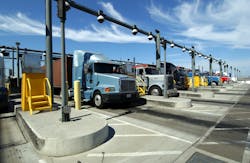California port truckers on strike-- again
Drayage truckers engaged in a long-running and contentious labor dispute with three trucking companies that serve the Port of Los Angeles and the Port of Long Beach have once more elected to go on strike.
This time out, the drivers claim the strike will run for an “indefinite” time, according to a news report filed by the Associated Press (AP).
Another potential concern of these and other West Coast ports is that almost 20,000 dockworkers are currently working without a contract. The International Longshore and Warehouse Union and the employers’ representative, the Pacific Maritime Assn., are negotiating a new contract to replace the one that expired July 1. However, the longshoremen's union and the maritime association have jointly pledged to keep cargo moving until an agreement is reached, noted a news story by the Los Angeles Times.
The more than 120 truckers who walked off the job on Monday are claiming extensive workplace violations are being committed against them by Green Fleet Systems, Pacific 9 Transportation and Total Transportation Services Inc.
It is the fourth such job action at the ports in the last year and the initial picket lines on Monday were backed by Teamsters Local 848.
Justice for Port Truck Drivers, a Teamster-supported advocacy group, is taking pains to emphasize that this trucker strike will be far more intense than the job actions at the ports that preceded it.
According to a press statement released by Justice for Port Truck Drivers, the “unfair labor practice strikes” by port truckers “from three of Los Angeles’ leading drayage firms” represent “a dramatic escalation from prior actions, which, like many other low wage worker strikes over the past year, were 24-48 hours in duration.
“These escalating actions come as the drayage industry is growing increasingly desperate and retaliatory, doing everything it can– including unending retaliation in flagrant violation of U.S. labor laws – to hold onto a business model that relies on independent contractors,” per the statement.
The port-trucker advocacy group added that in a “desperate quest to maintain the status quo,” the owners of the trucking companies targeted by the dispute are “firing, intimidating, and countersuing drivers; countersuing state agencies, filing appeals on trial court decisions; and filing to compel arbitration to stay government proceedings.
“These companies are continuing to retaliate against their employees for engaging in union and protected concerted activities,” the statement continued. “They are threatening and otherwise intimidating, restraining, and coercing employees in the exercise of their rights under the National Labor Relations Act.”
Weighing in on the dispute today was the California Trucking Assn.(CTA).
"While the California Trucking Association respects individuals' rights to peacefully exercise free speech, the timing of this labor disruption is highly irresponsible" said Shawn Yadon, CEO of CTA, in an emailed statement.
"At a time when the International Longshore and Warehouse Union and the Pacific Maritime Association have demonstrated great restraint during their contract negotiations," Yadon continued, "the Teamsters have instead chosen to create disruption. If these disruptions spill over into marine terminals, the national economy could lose hundreds of millions of dollars."
As for the strike’s impact on the ports thus far, a Port of Los Angeles spokesperson told FleetOwner that “cargo operations at the Port of Los Angeles on Monday continued with minimal impact from an ‘unfair labor practice’ protest involving port truck drivers from three local drayage firms.
“There were a handful of informational protesters at two Port of Los Angeles container terminals,” he continued, “but there has not been a disruption in cargo operations. Additionally, our overnight operations (Monday night/Tuesday morning) were normal.”
A spokesperson for the Port of Long Beach told FleetOwner that “picketers representing the Teamsters are at three Port of Long Beach container terminals; the three groups range from 7 to 11 individuals. Terminals [at the port] have just opened up and trucks are entering the terminals.”
